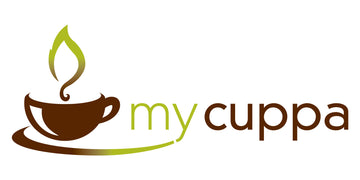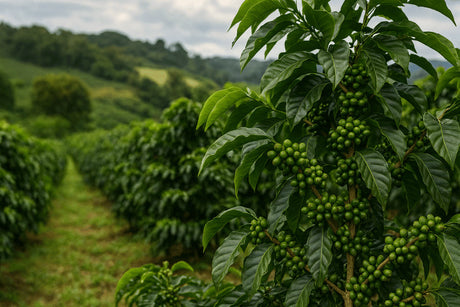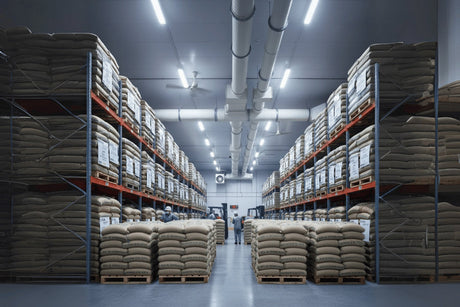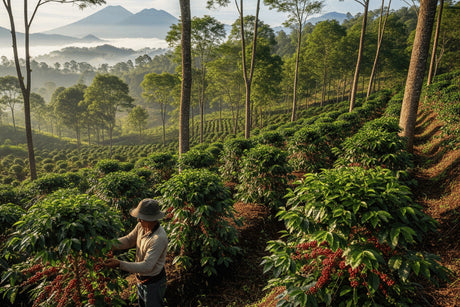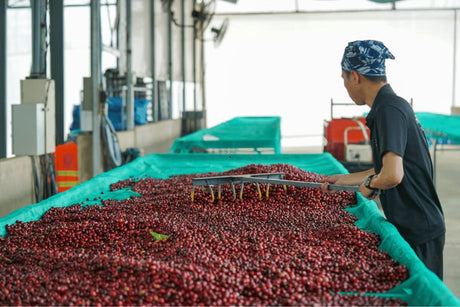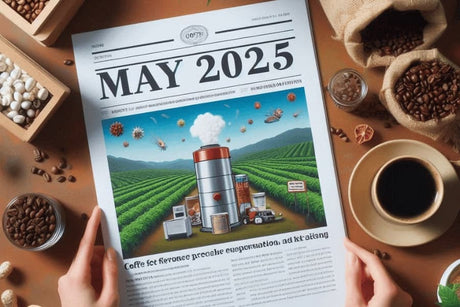"A mistake that makes you humble is better than an achievement that makes you arrogant." - Anonymous
mycuppa August 2023 newsletter
This month we provide some commentary on changes in the coffee industry along with a guest blogger segment called "5 minutes in coffee with Betty".
I suppose it was bound to happen eventually after an extended golden run of low incidents and reasonably prompt transit times.
AusPost well and truly hit the wall during June and July but what is interesting this time round is that we definitely didn't see any of these shenanigans happen last year in 2022.
As we don't receive any performance reports or service trend info from AusPost we have to rely upon customers reporting incidents to us as they happen - that's never going to be good for anyone.
Longer transit times, mis-routed parcels traveling into the wrong state (a significant increase in that incident type) and parcels suspiciously disappearing from inside of the AusPost parcel network, a.k.a The Black Hole.
Yep, the last couple of months have been tarnished with many of the things that retailers suffered through for 2 years during the pandemic. To see it returning was indeed quite disappointing.
We put the latest rounds of crap service down to school holiday periods and perhaps a 1/3 of the Australian population deciding to head overseas to escape the misery of another Australian winter.
Bottom line - it seems almighty likely there were not enough people to do the job of running a parcel service properly (we continue to see driver and van shortages for collections). That's right folks, AusPost seem to be either unable or unwilling to attract and retain staff or they are well into yet another round of "cost cutting" programs.
The good news is that we are seeing some improved trends on parcel incidents now that most of the mid-year holiday periods are behind us.
End of the road for ESE coffee pods.
As one of the largest sellers of Australian-made ESE Coffee pods over the last 14 years, it has been rather sad to see the rapid decline in the segment.
It’s no secret we firmly believe ESE pods deliver a superior coffee experience compared to the classic Nespresso capsules, and at the same time ESE has a substantially lower carbon footprint.
But the sellers of equipment failed to see the opportunity and it allowed Nespresso systems to gain a critical mass in market share through the power of marketing.
The only contract converter of fresh roasted coffee beans into ESE pods closed 5 months ago. Their aging equipment was bought by another Australian coffee roaster and what a surprise they have been moving so slowly to get back up and running again.
Perhaps that was their plan all along, kill off competition and force other brands out of the market - by the play book.
What it means for ESE coffee drinkers is currently there are extreme shortages, except for the stale, low-grade, robusta-laden imported ESE pods. Less choice may also mean higher prices, less competition and questionable quality.
ESE pods were a good portfolio product for us to showcase our expert roasting skills in creating small-dose portion control without the lazy way of resorting to robusta. It was never easy, but we like to think we gave it a red-hot crack.
We have decided to exit that segment to focus upon our in-house production of Nespresso classic capsules.
The stuff of Secrets
This month’s Secret Label is a stunning sweet sensation - goodness it even surprised us.
Perfect for black coffee drinkers or in milk it sings the notes of coffee love. Fruit cake with elegant strawberry and a tasty chocolate finish.
This month we crafted a delicious blend of fruit cake and chocolate that quite frankly is the sweetest offer we have ever released.
Perfect as a black coffee or in milk that sweetness soars.
A coffee that could be sold for $50 a kilo and still please everyone. Seriously great value.
Grab it here Secret Label.

We hope you enjoy our guest blogger Betty.
Betty asks people working in the industry questions about themselves and grab their take on all things coffee.
First up is our founder and roaster Jeff (despite spirited protest..... "this is not what I had in mind Betty!").
Betty:Where did it all start with you and coffee Jeff ?
Jeff: My mother worked in hospitality her whole life and was pretty good at it. She owned restaurants and cafes in Newcastle during the 1980's and 1990's, then went onto teaching for another decade. Mum was one of the eager and early adopters of big commercial espresso machines in her busy cafe during the early 1980's and with support only available from Sydney, Dad and I often had to fix that cantankerous machine. I guess that ignited my initial love affair with espresso coffee.
A work trip to Papua New Guinea in 1992 offered a rare opportunity to visit coffee plantations in the highlands tasting amazing wild grown coffees. That was probably a pivotal moment the penny dropped. Ever since I could no longer resist a desire to learn more about great coffee.
Betty:What is your typical daily coffee routine ?
Jeff: First coffee around 5am is a milk-based double shot espresso before roasting. Just after 7am when things are running well, I sneak in a quickly prepared double-ristretto during roasting.
When roasting finishes around midday, I make coffees for the whole team and it's another milk-based double-shot espresso for me using one of the many dozens of QA samples waiting for test.
Some afternoons we are testing more samples, these will either be prepared as traditional cupping protocol or run through the espresso machine. Traditional cupping is not my preferred way of evaluating coffees (I hate it to be honest) and in this regard I'm staunch non-conformist within our coffee industry.
Weekends are limited to just 2 milk-based double shot espresso per day so that some caffeine can get out of my system. It's true, I constantly live with in fear or dread of being perpetually overloaded with caffeine.
Betty:You roast and sell a lot of different coffees Jeff - does that make it difficult to pick a favorite ?
Jeff: Absolutely. It changes all the time - perhaps weekly. Redemption of the Spro is an enduring fave along with Suuweet and Secret Label. Bensa and Kenya seem to be present in my grinder often and that’s a good thing.
As I get older, fruitier coffees tend to appeal more with their inherent complexity. There is a certain X-factor to fruity coffees. Caramel and chocolate get pretty boring easily.
Betty:So I see you have a few roasting systems here in your warehouse - why do you need them and which system do you like roasting on best ?
Jeff: We have owned 7 different roasting platforms over the last 16 years. Some of them we outpaced as our business grew rapidly and yet others were installed due to a need for moving into larger premises.
A typical lifecycle for implementing any new roasting platform is around 12 months. The nature of our online business means we had to build an entirely new, duplicate infrastructure as we can't sustain downtime due to the daily time demands for rapid roast, pack and ship.
Online coffee is remarkably different and challenging compared to the simplicity of wholesale or retail where they can roast a week or more ahead.
Our custom-built Proaster is indeed a very special platform and in my opinion a key differentiator as it's the only one of it's type in the world. Manufacturers stopped building pure cast iron roasters around 35 years ago so this contemporary platform with the highly desired full cast iron components coupled with modern control systems and special burners enables us to produce any possible coffee result imaginable.
It truly is the most responsive and dynamic platform available globally, even in today's market you can't get anything close to matching it. I truly feel grateful for all the sacrifices we made early on to get this platform designed, built and operational - a definitive game changer for sure.
Just like owning a collectable sports car instead we use it daily.
The other platforms we roast on are for specialized purposes. A fully automated Brambati industrial plant is capable of roasting 15 tons per week and a smaller cast iron platform for QA and development work.
The industrial plant is not to be underestimated - it's seriously intelligent as the most advanced roasting solution available in the world. Oh, by the way it also happens to roast our most popular and highest selling coffee, so that speaks volumes to it's inherent capability.
Betty:What's the hardest part of your job ?
Jeff: Getting up at 4:30am each morning is pretty tough, there is no sleeping in or if you are sick or injured, we still come to work and roast, otherwise our business falls into a hole and everything is timed in minutes, not days.
Perhaps the hardest part is sourcing of raw coffees to suit our portfolio is not easy and at times I'm sure the brokers get mighty annoyed with me.
There are plenty of expensive coffees that taste nice and selecting the ones that represent great value can be difficult.
If the buyers of roasted coffee cared about taste-only and price was never a factor, then it would be a lot easier. But for us, ever since 2007 we have worked to offer a better value coffee - whether that's price, freshness, quality or speed.
Keeping all of those elements performing at their best takes a lot of extra effort that is difficult to quantify.
Betty:Where do you think the coffee industry is heading in the future ?
Jeff: That's a really good question Betty and I'm afraid there are no simple or easy answers, even I don't know for sure.
Over the last 13 years the global coffee industry has been like the gold rush era of the 1800's with more than 3,000 brands in Australia today all hustling for a slice of the coffee pie that barely grows at 2% pa.
Not hard to work out that is neither sustainable or healthy, like any rush (or bubble).
Even with today economic headwinds, there seems to be no slow down of new players entering the market. I often scratch my head and ask "why ?".
It's not clear how can are surviving with barely any customers, no decent volume and that can only mean there are no returns. Manufacturers of roasting equipment tell us they have never seen it so frantic with lead times stretching over 12 months - somewhat similar in trying to buy a popular hybrid motor vehicle.
so there always going to be plenty of capacity over-supply with 98% of coffee brands running their systems less than 30% of the working week.
My concerns are that it may only end one way - brutal price wars.
Price wars have always existed in the wholesale coffee segment long before the explosion in new brands. Especially when cafes are pinched or stolen there will be a tit-for-tat response.
We think some of that hostility will inevitably spill over into the retail side as young, immature brands become desperate for sales and revenue without thinking through the full consequences.
The only thing stopping that from happening over the last 4 years has been a constant escalation and increase in operating costs. You literally face new cost increases every month, so that is probably holding back a lot of brands from being too aggressive for fear they will fall on a sharp object called “lack of profitability”.
Often when industries become crowded or saturated there is a period of consolidation. Unfortunately, consolidation does not seem to be an attractive option in the Australian coffee industry (yet in the US there remains an ongoing and healthy appetite for mergers and acquisitions).
Brands won't pay premiums in Australia to buy competitors when it's so easy to just steal their customers using incentives or unsustainable pricing.
A handful of large brands acquired over the last few years had the gloss stripped away by later discoveries some of those high profile brands were laden with unsustainable debt. In other words, the sale was to a savior.
With raw coffee pricing at a 20 year high, energy prices at eye-watering levels and inflationary factors driving up all input costs, returns have diminished from the golden days.
Pre-pandemic the supermarkets tried their hand at igniting price wars and whilst that gusto has retreated it likely to be only a temporary truce and we can expect more price wars in the near future once raw coffee prices drop.
It's should not be considered cruel to think our Australian coffee industry needs a bit of a "clean out" after more than a decade of unabated expansion. Just how that plays out is anyone's guess.
Betty:Thank you Jeff, that 5 minutes certainly blew out to well over 15, but it was really informative and enjoyable.
